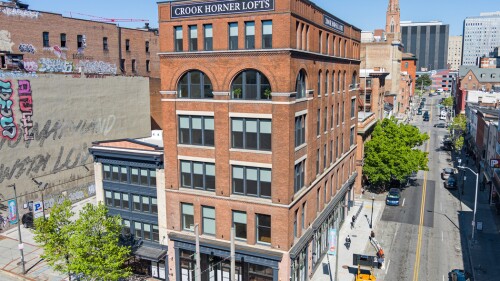Commercialized marijuana is big business and is expanding as a new asset class at an astronomical rate, according to a ULI Spring Meeting panel of industry investors, operators, and legal experts on the state of the cannabis business and real estate opportunities being created in the sector.
Twenty-eight states have legalized the sale of medical marijuana, and eight states plus the District of Columbia allow recreational marijuana to some degree. Cannabis is here to stay, panelists said, arguing that they are not worried that the U.S. government will disrupt a sector that is bringing in valuable tax revenue for states. Colorado, for example, earned nearly $200 million in tax revenue last year from $1.3 billion in marijuana sales.
Moderator Michael Atkins, president of Cormorant Capital, a New York–based real estate equity firm, said the marijuana sector is a $7 billion industry predicted to grow to $50 billion by 2026.
“What attracted me was that you had an emerging business coming out of the shadows, and it required real estate,” said George Stone, chief executive officer of New York City–based Kalyx Development., owner of nine cannabis-producing properties in Arizona, Colorado, Oregon, and Washington. “There’s really a new vertical [vertically integrated business] within real estate. There wasn’t a cannabis type until a couple years ago, but now there are millions of square feet of space.”
The cannabis industry parallels the colocation trend 20 years ago in the early days of the internet, which required development of big data centers, Stone said. “Colocation and cannabis both require lots of power, air conditioning, security, and data,” he said.
This new asset class “should have a similar opportunity to grow and prosper,” though siting is difficult because of NIMBY (not in my backyard) issues, he said. “A lot of people don’t understand and are fearful of what they don’t know,” he said. “If I said I’m hiring 100 people, people would approve. But when locals find out it’s a [cannabis] production facility, they don’t want it. Pfizer could come in and open an opioid production facility more easily.”
Another hurdle is lack of access to capital from traditional lenders because of federal laws. “My life previously revolved around leverage, but this industry is all cash,” noted Stone. “If you become the accidental landlord, you have to understand your bank might not like that on your property or in your portfolio.”
Stone offered an example of his firm’s repositioning of underused real estate—the adaptive use of a mid-1990s building in Eugene, Oregon, built for $85 million to produce disc drives. Kalyx paid $3 million to buy the building, which has a backup generator, chilled water systems, and cooling towers. His firm can provide lower operating costs to tenants in the building compared with the cost of occupying a new building, he said.
Seattle-based Privateer Holdings was launched in 2011 as the world’s first private equity firm investing exclusively in legal cannabis, said Brendan Kennedy, chief executive officer of the company, which operates with 400 employees in seven states and seven nations. It has raised over $130 million and is on target to raise $160 million in capital by the end of this year.
It includes portfolio companies Leafly, a cannabis information and strain review app; Tilray, a federally licensed commercial medical marijuana production facility; and Marley Natural, a global recreational cannabis brand, developed in partnership with reggae musician Bob Marley’s family.
“Globally, we’re heading toward a $50 billion recreational industry in black, gray, and legal cannabis,” Kennedy said. “The medical [cannabis] industry is about a $100 billion industry.” He said the industry is “speeding up, not slowing down, and it’s a matter of which country next.”
“Cannabis requires a huge amount of capital expenditures,” said Kennedy, whose company has real estate investments in Canada, the United States, and Europe. Capital investors in the cannabis sector are different from those in other sectors, said Kennedy. “Most were looking for a financial return, but [also] were looking for social justice returns,” such as individual liberties, state rights, and an end to mass incarceration of African American men on drug charges.
“We have raised $30 million from institutional investors that many people would recognize, and they’re looking for an 18 percent return.” But still it is hard to find investors, and Privateer Holdings has used mostly family capital, he said. Stone noted that Privateer Holdings is building 1 million square feet (93,000 sq m) of purpose-built facilities because it has the capital to do so.
Long-time ULI leader Ken Munkacy, speaking as a private individual, appeared on behalf of his wife Karen Munkacy, a board-certified anesthesiologist and cancer survivor, who had researched medical marijuana and learned that medical benefits of cannabis were backed by a broad base of scientific evidence.
As founder and chief executive officer of Massachusetts-based Garden Remedies, she developed both a medical marijuana cultivation facility in an 81,000 square-foot (7,500 sq m) former plastics molding operation in Fitchburg that now employs 55 people and a 1,500-square-foot (140 sq m) dispensary in Newton.
“In Massachusetts, you have to be vertically integrated,” said Munkacy. “It’s a nonprofit model,” intended to provide medical marijuana for public purpose. Real estate investment trusts “four years ago wouldn’t touch Garden Remedies; now they’re all over the opportunity,” he said. Challenges include still-constrained capital; even though the company is “de-risked,” he said, “it’s hard to find the sites for expansion.” He said as a growth industry, marijuana is rich with possibilities for “real estate, big pharma, medical, retailing, private equity, and legal” interests.
Joshua C. Brower, an attorney with the Seattle-based Veris Law Group, noted that though marijuana is legal under Washington state law, it is still a controlled substance at the federal level, and local governments retain full zoning and land use regulatory authority. “You may find even once you get a license you have to deal with local jurisdictions” over issues like wastewater discharge, he said.




